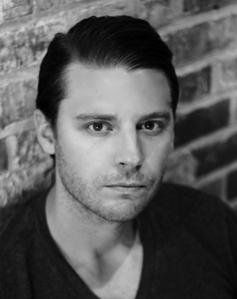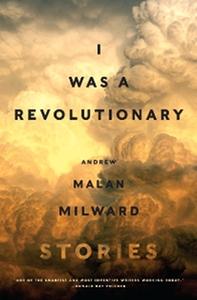
|
|
| photo: Gwen Walstrand | |
A native of Lawrence, Kan., and a graduate of the Iowa Writers' Workshop, Andrew Malan Milward is the author of the story collection The Agriculture Hall of Fame, which was awarded the Juniper Prize for Fiction by the University of Massachusetts. He has served as the McCreight Fiction Fellow at the University of Wisconsin, a Steinbeck Fellow at San Jose State University and has received fellowships and awards from the Lannan Foundation, Jentel and the Corporation of Yaddo. He lives in Hattiesburg, Miss., where he teaches at the University of Southern Mississippi's Center for Writers and is editor-in-chief of Mississippi Review. His story collection, I Was a Revolutionary, was published by HarperCollins on August 18, 2015.
On your nightstand now:
I'm rereading two of my all-time favorite novels: Underworld by Don DeLillo and E.L. Doctorow's Ragtime. I also have a book called Narratology by Mieke Bal on the nightstand, as well as Narrative Discourse by Gerard Genette. I always have a volume of poetry going, which right now happens to be Tyehimba Jess's amazing leadbelly. And tucked under that are the latest issues of Jacobin magazine and n+1.
Favorite book when you were a child:
I was sort of the weirdo in a family of ardent readers. As I child, I was more concerned with playing basketball, so my favorite book was probably Larry Bird's autobiography, Drive, but I guarantee you I only read half of it so I could fake my way through the book report.
Your top five authors:
Well, as I see it, every great basketball team can't just rely on the starters--it needs at least a seven- or eight-player rotation to succeed, so here's what my team would look like:
Starting Five:
- James Baldwin
- George Orwell
- E.L. Doctorow
- Don DeLillo
- Marilynne Robinson
Key Reserves:
- W.G. Sebald
- David Foster Wallace
- David Means
Head Coach:
William Faulkner
Book you've faked reading:
Basically every book from age 6 to 16. More recently, however, I was having a conversation at a party, and my interlocutor was very smart and charming, and she asked if I'd read Roberto Bolaño's 2666. Actually, she didn't ask--she just assumed (which in retrospect feels like a test that I was born to fail), asserting something to the effect of, "Well, you've read 2666, so you know exactly what I'm talking about." I had no idea what she was talking about, but I'd become sort of entranced by her and was equally shamed that I hadn't read the book but flattered she thought I had, so found myself nodding with 100% conviction and solemnity, as though we were the only two readers on earth who truly understood Bolaño's masterpiece.
 Book you're an evangelist for:
Book you're an evangelist for:
There are so many! My favorite short story writer is David Means. His stories are beautiful, violent and weird in the most wonderful ways. Many fellow writers rightly revere him, but he's not nearly as well known and appreciated as he should be. So I often find myself grabbing people by the shoulders and making them promise to buy Assorted Fire Events, since that was the first book of his I read. Check it out. It'll knock you on your ass.
Book you've bought for the cover:
The Collected Poems of Zbigniew Herbert. It has a beautiful, almost entirely black front cover that shows a silver-haired Herbert, from the shoulders up, lighting a cigarette. It seemed to augur good things, and sure enough it did.
Book that changed your life:
I wasn't much of a student in high school, and I went to college to play basketball. In the spring semester of my freshman year there was a mix-up at registration and I ended up in a senior-only seminar on post-Vietnam fiction. The professor took pity on me and let me stay in the class, and I'm so thankful he did because it was my first exposure to contemporary literature. Somehow I'd gotten through high school without reading anything post-Cuckoo's Nest, so I had no idea who Louise Erdrich, Andre Dubus, Tobias Wolff and Bobbie Ann Mason were, to say nothing of the many other wonderful Vietnamese and American writers we read. This was 1999, and Tim O'Brien's Tomcat in Love had recently come out and it was on the syllabus. I loved it and proceeded to read everything of his I could get my hands on. While I loved some of his other books more, Tomcat was the gateway drug, not only to Tim's work but to all of contemporary literature. It changed my life. I quit playing basketball and decided that I wanted to be a writer, a decision that was universally considered batshit by everyone in my life, but hey, it's worked out okay.
Favorite line from a book:
"I want to be an honest man and a good writer."
This is the last line of James Baldwin's essay "Autobiographical Notes," which opens his classic Notes of a Native Son. While there are approximately 176 other Baldwin quotes that I could use to answer this question, this line killed me. My marginalia next to it reads: I love this man.
Which character you most relate to:
Woody Guthrie is one of my personal heroes, and his autobiography Bound for Glory is, to my mind, one of the great works of 20th-century American literature. While the book is nonfiction, the version of himself that Woody presents to the reader is indeed a character, and it's one I found myself relating to for a few reasons. Like him, I grew up in the heart of the country. His Oklahoma and my Kansas both have honorable and radically progressive pasts, histories that have sadly been obscured by the reactionary conservatism of the last 50 years. Like Woody, I love my home state, but it's something I react against as well, and so I think our homes have served as muses for us and our respective arts.
And on a personal note, my mother, like Woody, was a wonderful folksinger. She was in a band called The Tavernier Trio that was regionally popular and even opened for Peter, Paul and Mary. I grew up around her fellow folkies and their songs and storytelling, so I related to Woody's desire to write folksongs about real people and real struggles, or as he put it so beautifully in the title of another book he collaborated on with Alan Lomax: Hard Hitting Songs for Hard-Hit People.
Book you most want to read again for the first time:
I'd love to be able to read E.L. Doctorow's Ragtime again for the first time. The book blew me away, and still does, but the first time reading it I was struck by how much capital-F fun it was to read, and not in a turn-off-your-brain beach-read kind of way. It's an absolute pleasure to read--the pages fly by--and it does so without sacrificing complexity, intelligence and craft. I have no idea how he pulled it off.

